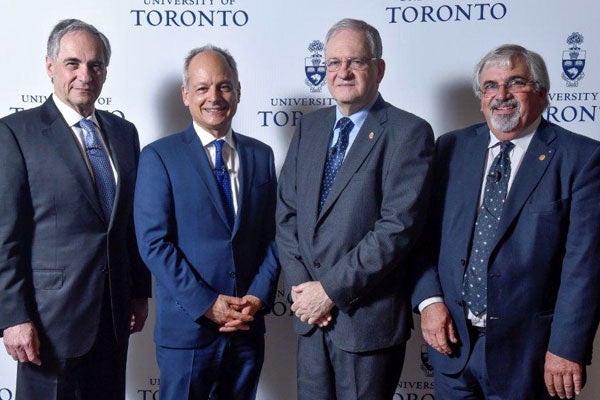
Cities of Learning: The University in the Americas
Published: May 20, 2015
In seven weeks, athletes and visitors from throughout the Americas will converge on the Greater Toronto Area – including the University of Toronto – for the 2015 Pan Am/Parapan Am Games.
But even before they arrive, U of T is already celebrating the games, with a series of academic and cultural events including a symposium on sports science research and, last week, a conference on universities and cities in North and South America called Cities of Learning: The University in the Americas.
The highlight of the two-day conference was a panel discussion involving U of T President Meric Gertler as well as the presidents of the University of Chicago and the University of São Paulo and a senior official from the University of Buenos Aires. Besides the presidential panel, there were many other sessions, including discussions on helping cities navigate global change, healthy food in cities, hosting mega-events and transportation planning.
The Cities of Learning symposium brought together scholars, diplomats, city officials, architects and others from throughout the Americas to discuss how cities and universities can learn from each other, said University of Toronto Scarborough Principal Bruce Kidd in his opening remarks.
Just as the Toronto 2015 Pan Am/Parapan Am Games “seek to give meaning to the human experience in the Americas, we seek to think out loud about that experience through the lenses of the city and university,” Kidd said.
“Traditionally, Toronto has looked to New York City, Chicago, Los Angeles and Europe for examples of how to address the issues that we face as a city. But what can we learn from the Americas? These are remarkable cities in remarkable societies with stories of extraordinary social and democratic advances, new ways of approaching equity, innovations in transportation, infrastructure, physical activity, sport and much else.”
The three presidents – Gertler, Robert Zimmer from the University of Chicago and Marco Antonio Zago from the University of São Paulo – along with University of Buenos Aires International Relations Secretary Gabriel Capitelli, discussed how their universities and cities mutually benefit each other and how the university enhances the prosperity and social wellbeing of the city.
Zago said his university has a big impact on the life of São Paulo, with its hospital complex, four museums, a theatre, and large green spaces that are open to all city residents. The University of São Paulo’s centres for metropolitan studies and the studies of violence also help the city find solutions to its problems, he said.
Zimmer discussed his university’s relationship with its neighbours in the economically disadvantaged area of South Chicago. The University of Chicago is trying to help the neighbourhood through five urban labs that deal with crime, health, education, poverty, energy and the environment, he said. “We have an obligation to the community.”
 Gertler (pictured above) said that universities and their cities have a symbiotic relation: a strong university helps build a strong city and a strong city helps build a strong university. One of the most important roles of a university in a city is to act as portals of opportunities for all segments of the population, including the disadvantaged and newcomers to the region, he said.
Gertler (pictured above) said that universities and their cities have a symbiotic relation: a strong university helps build a strong city and a strong city helps build a strong university. One of the most important roles of a university in a city is to act as portals of opportunities for all segments of the population, including the disadvantaged and newcomers to the region, he said.
U of T also exerts a positive impact on its local neighbours, Gertler said. Even its two newest campuses, Scarborough and Mississauga, are half a century old, and as for the St. George campus, “We’ve been here since 1827, and we’re not planning to move any time soon.”
Gertler concluded by emphasizing that one of his top priorities is to leverage U of T’s location more fully, for the mutual benefit of the university and the city.
“We are committed to ensuring that, through its design, planning and construction activity, U of T is a progressive force in the city.”
Terry Lavender writes about cities and global issues for U of T News.



